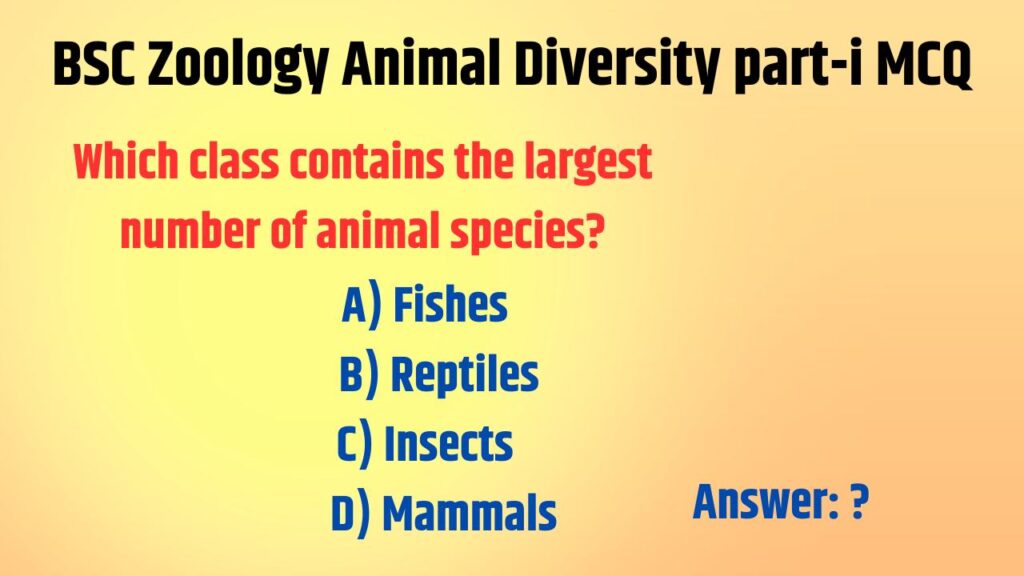Studying BSC Zoology Animal Diversity part-i MCQ is Good for your Exam Preparation. They Can Help You To Cover Maximum Syllabus In Minimum Time.
Zoology Is A Difficult Subject if You Lack Knowledge About Its Topics. In This Post We Have Compiled Some important BSC Zoology Animal Diversity part-i MCQ.

These BSC Zoology Important Mcqs with answers Mentioned Here Are Extracted From Previous Year Question Papers And They Help You Learn Important Knowledge about BSC Zoology Animal Diversity part-i MCQ
BSC Zoology Animal Diversity part-i MCQ

Animals are characterized as multicellular, heterotrophic, eukaryotic organisms that derive nutrition from other organisms. Which of the following is NOT a feature of animals?
A) Multicellular
B) Autotrophic
C) Eukaryotic
D) Heterotrophic
Answer: B) Autotrophic
Which is considered the most primitive group within the animal kingdom?
A) Arthropoda
B) Mollusca
C) Porifera
D) Coelenterata
Answer: C) Porifera
Which class contains the largest number of animal species?
A) Fishes
B) Reptiles
C) Insects
D) Mammals
Answer: C) Insects
What is the defining characteristic of acoelomates?
A) Absence of mesoderm
B) Absence of brain
C) Coelom incompletely lined with mesoderm
D) Solid body without a cavity surrounding internal organs
Answer: D) Solid body without a cavity surrounding internal organs
To which class does the salamander belong?
A) Pisces
B) Aves
C) Reptiles
D) Amphibian
Answer: D) Amphibian
Which of the following combinations is incorrect?
A) Nematoda – Roundworms, Pseudocoelomate
B) Calcarea – Gastrovascular cavity, Coelom present
C) Echinodermata – Coelom present, Bilateral symmetry
D) Platyhelminthes – Gastrovascular cavity, Flatworms, Acoelomate
Answer: B) Calcarea – Gastrovascular cavity, Coelom present
Flame cells serve as excretory structures in which of the following phyla?
A) Annelida
B) Coelenterates
C) Platyhelminthes
D) Echinodermata
Answer: C) Platyhelminthes
Phylum Porifera is classified based on which of the following criteria?
A) Branching
B) Symmetry
C) Spicules
D) Reproduction
Answer: C) Spicules
The development of the canal system in sponges is due to what?
A) Porous walls
B) Gastrovascular system
C) Reproduction
D) Folding of inner walls
Answer: D) Folding of inner walls
Select the correct pair:
A) Arthropoda – Silver fish
B) Pisces – Jelly fish
C) Echinodermata – Cuttle fish
D) Mollusca – Star fish
Answer: A) Arthropoda – Silver fish
Which group does not contain a polyp stage?
A) Anthozoa
B) Hydrozoa
C) Scyphozoa
D) Calcarea
Answer: D) Calcarea
Ascaris is characterized by:
A) Presence of true coelom and metamerism
B) Presence of true coelom but absence of metamerism
C) Absence of true coelom and metamerism
D) Absence of true coelom but presence of metamerism
Answer: B) Presence of true coelom but absence of metamerism
Cnidaria is characterized by which of the following?
A) Tissue level of organization
B) Nematoblasts
C) Coelenteron
D) All of the above
Answer: D) All of the above
In which group does the notochord persist throughout life and along the entire length of the body?
A) Cephalochordata
B) Hemichordata
C) Urochordata
D) Vertebrata
Answer: A) Cephalochordata
Periplaneta belongs to which phylum?
A) Mollusca
B) Arthropoda
C) Annelida
D) Echinodermata
Answer: B) Arthropoda
Which of the following is NOT a characteristic of epithelial tissue?
A) Covers all outer surfaces of the body
B) First line of protection from damage
C) Contains intercellular spaces
D) Stores energy
Answer: D) Stores energy
What is the optimal pH for pepsins in the stomach provided by HCl?
A) pH 1.8
B) pH 2.5
C) pH 3.0
D) pH 4.5
Answer: A) pH 1.8
Insects respire through which of the following structures?
A) Gills
B) Lungs
C) Tracheae and tracheoles
D) Skin
Answer: C) Tracheae and tracheoles
The term ‘arthropod’ means which of the following?
A) Segmented body
B) Jointed legs
C) Exoskeleton
D) All of the above
Answer: B) Jointed legs
Cuttlefish belong to which phylum?
A) Arthropoda
B) Mollusca
C) Chordata
D) Echinodermata
Answer: B) Mollusca
Which class of animals is warm-blooded?
A) Reptilia
B) Amphibia
C) Aves
D) Pisces
Answer: C) Aves
Bacilli are bacteria that are characterized by which shape?
A) Spherical
B) Rod-shaped
C) Spiral
D) Comma-shaped
Answer: B) Rod-shaped
Which animal has the largest brain in proportion to its body size?
A) Elephant
B) Chimpanzee
C) Dolphin
D) Human
Answer: C) Dolphin
Sharks are considered to be what type of animals in terms of blood temperature?
A) Warm-blooded
B) Cold-blooded
C) Variable-blooded
D) None of the above
Answer: B) Cold-blooded
The heart of Pisces typically has how many chambers?
A) One
B) Two
C) Three
D) Four
Answer: B) Two
Also Read: BSC Zoology 1st semester Notes: Important Topics
We hope that with the help of this article you would have got information about BSC Zoology Animal Diversity part-i MCQ.
Friends, how did you like this post, please let us know in the comment section and if you have any questions, then feel free to ask us in the comment box. If you found this post useful please share it with others.